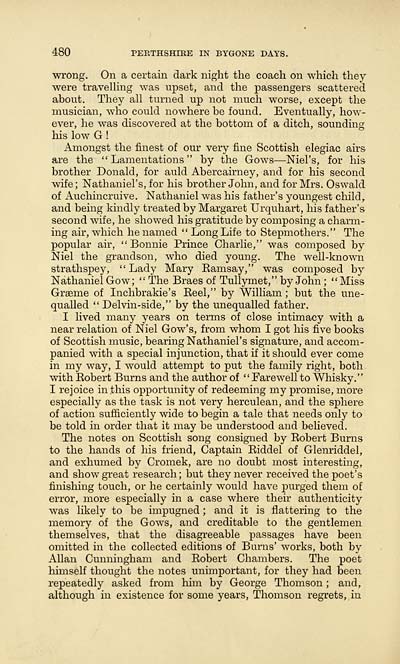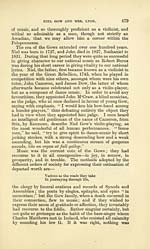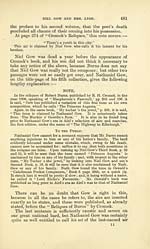Perthshire in bygone days
(508) Page 480
Download files
Complete book:
Individual page:
Thumbnail gallery: Grid view | List view

480 PERTHSHIRE IN BYGONE DAYS.
wrong. On a certain dark night the coach on which they
were travelling was upset, and the passengers scattered
about. They all turned up not much worse, except the
musician, who could nowhere be found. Eventually, how-
ever, he was discovered at the bottom of a ditch, sounding
his low G !
Amongst the finest of our very fine Scottish elegiac airs
are the " Lamentations " by the Gows — Niel's, for his
brother Donald, for auld Abercairney, and for his second
wife; Nathaniel's, for his brother John, and for Mrs. Oswald
of Auchincruive. Nathaniel was his father's youngest child,
and being kindly treated by Margaret Urquhart, his father's
second wife, he showed his gratitude by composing a charm-
ing air, which he named " Long Life to Stepmothers." The
popular air, "Bonnie Prince Charlie," was composed by
Niel the grandson, who died young. The well-known
strathspey, "Lady Mary Eamsay," was composed by
Nathaniel Gow; " The Braes of Tullymet," by John ; " Miss
Graeme of Inchbrakie's Beel," by "William ; but the une-
qualled " Delvin-side," by the unequalled father.
I lived many years on terms of close intimacy with a
near relation of Niel Gow's, from whom I got his five books
of Scottish music, bearing Nathaniel's signature, and accom-
panied with a special injunction, that if it should ever come
in my way, I would attempt to put the family right, both
with Eobert Burns and the author of "Farewell to Whisky."
I rejoice in this opportunity of redeeming my promise, more
especially as the task is not very herculean, and the sphere
of action sufficiently wide to begin a tale that needs only to
be told in order that it may be understood and believed.
The notes on Scottish song consigned by Bobert Burns
to the hands of his friend, Captain Biddel of Glenriddel,
and exhumed by Cromek, are no doubt most interesting,
and show great research; but they never received the poet's
finishing touch, or he certainly would have purged them of
error, more especially in a case where their authenticity
was likely to be impugned ; and it is flattering to the
memory of the Gows, and creditable to the gentlemen
themselves, that the disagreeable passages have been
omitted in the collected editions of Burns' works, both by
Allan Cunningham and Bobert Chambers. The poet
himself thought the notes unimportant, for they had been
repeatedly asked from him by George Thomson ; and,
although in existence for some years, Thomson regrets, in
wrong. On a certain dark night the coach on which they
were travelling was upset, and the passengers scattered
about. They all turned up not much worse, except the
musician, who could nowhere be found. Eventually, how-
ever, he was discovered at the bottom of a ditch, sounding
his low G !
Amongst the finest of our very fine Scottish elegiac airs
are the " Lamentations " by the Gows — Niel's, for his
brother Donald, for auld Abercairney, and for his second
wife; Nathaniel's, for his brother John, and for Mrs. Oswald
of Auchincruive. Nathaniel was his father's youngest child,
and being kindly treated by Margaret Urquhart, his father's
second wife, he showed his gratitude by composing a charm-
ing air, which he named " Long Life to Stepmothers." The
popular air, "Bonnie Prince Charlie," was composed by
Niel the grandson, who died young. The well-known
strathspey, "Lady Mary Eamsay," was composed by
Nathaniel Gow; " The Braes of Tullymet," by John ; " Miss
Graeme of Inchbrakie's Beel," by "William ; but the une-
qualled " Delvin-side," by the unequalled father.
I lived many years on terms of close intimacy with a
near relation of Niel Gow's, from whom I got his five books
of Scottish music, bearing Nathaniel's signature, and accom-
panied with a special injunction, that if it should ever come
in my way, I would attempt to put the family right, both
with Eobert Burns and the author of "Farewell to Whisky."
I rejoice in this opportunity of redeeming my promise, more
especially as the task is not very herculean, and the sphere
of action sufficiently wide to begin a tale that needs only to
be told in order that it may be understood and believed.
The notes on Scottish song consigned by Bobert Burns
to the hands of his friend, Captain Biddel of Glenriddel,
and exhumed by Cromek, are no doubt most interesting,
and show great research; but they never received the poet's
finishing touch, or he certainly would have purged them of
error, more especially in a case where their authenticity
was likely to be impugned ; and it is flattering to the
memory of the Gows, and creditable to the gentlemen
themselves, that the disagreeable passages have been
omitted in the collected editions of Burns' works, both by
Allan Cunningham and Bobert Chambers. The poet
himself thought the notes unimportant, for they had been
repeatedly asked from him by George Thomson ; and,
although in existence for some years, Thomson regrets, in
Set display mode to:
![]() Universal Viewer |
Universal Viewer | ![]() Mirador |
Large image | Transcription
Mirador |
Large image | Transcription
Images and transcriptions on this page, including medium image downloads, may be used under the Creative Commons Attribution 4.0 International Licence unless otherwise stated. ![]()
| Histories of Scottish families > Perthshire in bygone days > (508) Page 480 |
|---|
| Permanent URL | https://digital.nls.uk/94912494 |
|---|
| Description | A selection of almost 400 printed items relating to the history of Scottish families, mostly dating from the 19th and early 20th centuries. Includes memoirs, genealogies and clan histories, with a few produced by emigrant families. The earliest family history goes back to AD 916. |
|---|

